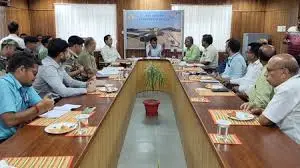Tripura holds high-level meeting to implement new restrictions on border trade with Bangladesh

Tripura, a northeastern state of India sharing a long border with Bangladesh, recently held a high-level meeting. The goal was to implement new restrictions on border trade with Bangladesh. These restrictions follow India’s central government decision to regulate imports from Bangladesh.
Background and Context
India imposed new curbs to control the types and volume of goods entering through land customs stations and Integrated Check Posts (ICPs) in Tripura. The government focused on protecting local industries from unfair competition.
The new rules restrict goods such as readymade garments, processed food, cotton products, plastics, and PVC. These items form a large part of Bangladesh’s exports to India through Tripura’s border. However, the government exempted essential goods like fish, edible oil, liquefied petroleum gas (LPG), and crushed stone. This ensures critical supplies continue to flow smoothly.
The Meeting: Key Participants and Discussions
Dr. Sailesh Kumar Yadav, Director of Tripura’s Industries and Commerce Department, led the meeting. Officials from the Border Security Force (BSF), Customs, and the Land Port Authority of India attended. Local trade bodies and importers also joined the discussions.
They focused on enforcing the new rules effectively. The meeting emphasized better coordination between security forces and trade regulators. Officials aimed to improve customs checks and prevent unauthorized goods from crossing the border.
Impact on Regional Trade
Border trade plays a vital role in Tripura’s economy. The state hosts several land ports that facilitate trade with Bangladesh. The new restrictions will affect trade in textiles, plastics, and other restricted sectors. Importers and exporters may face challenges adjusting to the rules.
Trade groups in Tripura expressed cautious support. The Tripura Chamber of Trade and Business (TCTB) said the restrictions might cause short-term disruptions. However, they agreed the rules help protect national interests and promote fair trade.
Broader Economic and Geopolitical Effects
India introduced these restrictions to boost self-reliance and shield vulnerable sectors. The move also responds to Bangladesh’s own trade restrictions on Indian goods.
India imports about USD 770 million worth of goods from Bangladesh through northeastern border points. Tripura is a key gateway for this trade. Nearly 42% of these imports now face restrictions. This policy may push Bangladeshi exporters to seek new markets or improve product quality.
Conclusion
Tripura’s recent meeting shows the government’s commitment to enforcing border trade rules. Though the restrictions will challenge existing trade flows, they aim to balance security, economy, and trade. Ongoing cooperation between government, security forces, and traders will ease the transition. Ultimately, these changes could lead to more sustainable and secure border trade in the region.






